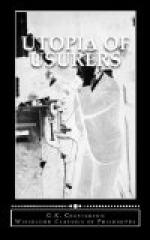Or suppose a bank cashier were admittedly allowed to take the money out of the till, and put it loose in his pocket, more or less mixed up with his own money; afterwards laying some of both (at different odds) on “Blue Murder” for the Derby. Suppose when some depositor asked mildly what day the accountants came, he smote that astonished inquirer on the nose, crying: “Slanderer! Mud-slinger!” and suppose he then resigned his position. Suppose no books were shown. Suppose when the new cashier came to be initiated into his duties, the old cashier did not tell him about the money, but confided it to the honour and delicacy of his own maiden aunt at Cricklewood. Suppose he then went off in a yacht to visit the whale fisheries of the North Sea. Well, in every moral and legal principle, that is a precise account of the dealings with the Party Funds. But what would the banker say? What would the clients say? One thing, I think, I can venture to promise; the banker would not march up and down the office exclaiming in rapture, “I’m a rebel! That’s what I am, a rebel!” And if he said to the first indignant depositor “You are a rebel,” I fear the depositor might answer, “You are a robber.” We have no need to elaborate arguments for breaking the law. The capitalists have broken the law. We have no need of further moralities. They have broken their own morality. It is as if you were to run down the street shouting, “Communism! Communism! Share! Share!” after a man who had run away with your watch.
We want a term that will tell everybody that there is, by the common standard, frank fraud and cruelty pushed to their fierce extreme; and that we are fighting them. We are not in a state of “divine discontent”; we are in an entirely human and entirely reasonable rage. We say we have been swindled and oppressed, and we are quite ready and able to prove it before any tribunal that allows us to call a swindler a swindler. It is the protection of the present system that most of its tribunals do not. I cannot at the moment think of any party name that would particularly distinguish us from our more powerful and prosperous opponents, unless it were the name the old Jacobites gave themselves; the Honest Party.
Captured Our Standards
I think it is plain that for the purpose of facing these new and infamous modern facts, we cannot, with any safety, depend on any of the old nineteenth century names; Socialist, or Communist, or Radical, or Liberal, or Labour. They are all honourable names; they all stand, or stood, for things in which we may still believe; we can still apply them to other problems; but not to this one. We have no longer a monopoly of these names. Let it be understood that I am not speaking here of the philosophical problem of their meaning, but of the practical problem of their use. When I called myself a Radical I knew




